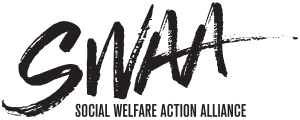WATCH THE EVENT
Can voting help advance a radical social work agenda? Does voting really matter since we have seen so little change in our larger institutions? We need to elect people who: respect the voice of the people and will not harm “the people”; support the services needed by service users and community members; support social service jobs; oppose corporate control of society and our lives; oppose voter suppression, election subversion and gerrymandering, etc. Is the rising authoritarianism of today stoppable through the electoral process alone? Join us in this conversation as we hear from students, clinicians and organizers, with time for you to ask questions and share your analysis.
Rosemary Barbera – moderator
Rosemary A. Barbera, Ph.D., MSS (she, her, hers) is a social worker and professor who has been working in human rights since the 1980’s in the U.S. and Latin America, including work with immigrants fleeing war and the violence of poverty from Latin America and Africa. She lived in Bolivia and Chile and was a human rights worker in both countries. She continues her work with survivors of human rights abuses in Chile as well as with the family members of the disappeared there. In the US she has worked with various immigrant rights organizations, the Social Welfare Action Alliance, the CSWE Commission on Global Social Work Education, the CSWE Committee on Human Rights, and SWCAREs – Social Work Coalition for Anti-Racist Educators. Current research examines the role memory plays in post-dictatorship society, community resilience after disaster, economic inequality, and building human rights social movements. She is an Associate Professor of Social Work at La Salle University.
Panelists
Mimi Abramovitz DSW (she, her, hers) the Bertha Capen Reynolds Professor of Social Policy at Silberman School of Social Work, Hunter College, and The CUNY Graduate Center is often introduced as an activist and a scholar. Her research interests include the US welfare state, poverty, inequality, activism. and the impact of public policy on human service organizations–all viewed through the lens of race, class and gender. Widely published in social work and often interviewed by the print and broadcast media, she is the author of four books including Regulating the Lives of Women: Social Welfare Policy from Colonial Time to the Present (Routledge, 3rd ed. 2018). She is currently writing Gendered Obligations: The History of Activism Among Black and White Working-Class Women Since 1900. Mimi is the co-founder of the Welfare Rights Initiative at Hunter College at Hunter College and currently co-leads the National Social Work Voter Mobilization Campaign also known as Voting is Social Work. Trained in community organizing and social policy at Columbia School of Social Work, she has been honored with 17 awards most recently induction into the Columbia University School of Social Work Hall of Fame. CSWE’s Significant Lifetime Achievement Award and Hunter College Presidential Lifetime Achievement Award
Jennifer Elliott (she, her, hers) is the President and founding member of University at Buffalo Association of Black Social Workers (UBABSW) chapter. She is in the MSW/PhD program at the University at Buffalo with research interest related to Intimate Partner Violence in the Black Community
Renee Koubiadis, MSW/LSW (she her, hers) Renee currently serves as Senior Policy Advisor for the New Jersey Department of Community Affairs Division of Housing and Community Resources. Prior, she was the Anti-Poverty Program Director of New Jersey Citizen Action where she led the statewide Anti-Poverty Network as she had since 2016. She previously served as the statewide Advocacy Coordinator of the National Association of Social Workers – NJ Chapter (NASW-NJ) and prior to that the Assistant State Campaign Director for the Citizens’ Campaign, a New Jersey non-partisan movement of hundreds of citizens dedicated to innovative government reform and promoting citizen leadership. Renee is co-creator of Garden State Leaders, a leadership and advocacy institute for people impacted by poverty. She currently serves on the Board of Trustees of the Movement Alliance Project, the Pediatric Council on Research and Education Advisory Council of the NJ Chapter of the American Academy of Pediatrics, and was a Steering Committee member of the Latino Action Network for 6 years. Renee is a Licensed Social Worker in New Jersey and holds an MSW from Temple University and a BASW from Rutgers University. Renee is also a member of SWEPT (Social Workers Ending Poverty Together), an issue-based SWAA chapter.
Maureen D. Taylor, MSW (she, her, hers) Since 1993, Maureen Taylor has served as Chair of the Michigan Welfare Rights Organization, a union of public assistance recipients, low-income workers and the unemployed that organizes members to fight for their rights and to eliminate poverty in this country. Over the past several years, Maureen spearheaded several MWRO campaigns to protect low-income Detroiters against electricity, gas and water shut-offs. She participated in negotiations for the Water Affordability Plan for the Detroit Water and Sewerage Department; and she was a key consultant on two award-winning documentaries, “The Water Front,” about water rights and water affordability in Highland Park, Michigan; and the film, “A World Without Water” on the crises of international water affordability and access which featured a segment on Detroit. Additionally, Maureen is a Detroit school counselor who is improving student and teacher success rates. Maureen is also a member of SWEPT (Social Workers Ending Poverty Together), an issue-based SWAA chapter.
Ashley Zayas, LCSW (they/them, xe/xem) is a clinical social worker who is currently in private practice, primarily with BIPOC and LGBTQIA+ clients. Xe is passionate about dismantling oppressive systems. They worked in a variety of non-profits for 8 years and are passionate about decolonizing therapy and creating a model that works better for our marginalized clients. Xe has been able to incorporate decolonization, anti-oppression, and anti-capitalism into xyr practice while working in non-profits and in private practice.
For more information on Voting is Social Work, find a lot of useful information and tools here: https://votingissocialwork.org/

